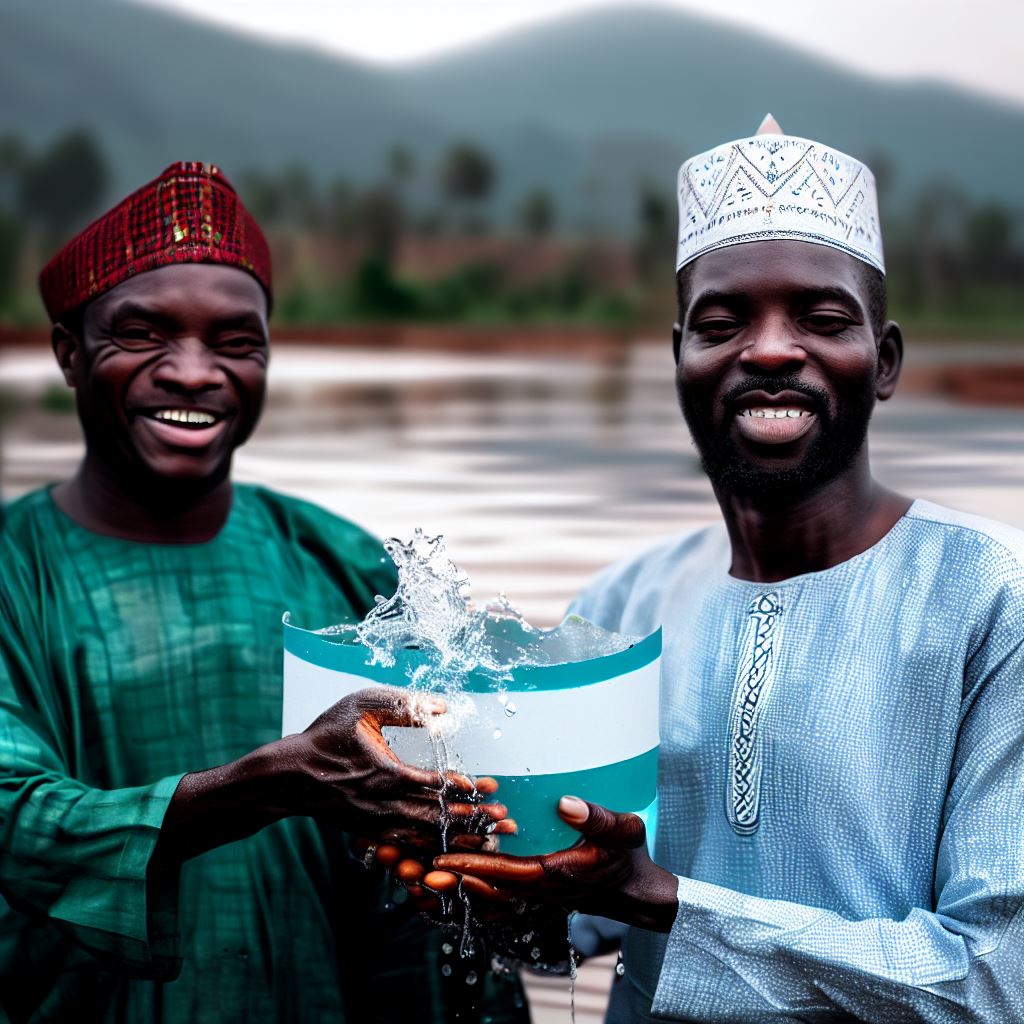Introduction
International partnerships in hydrology aim to foster collaboration and knowledge sharing among countries.
Hydrology is vital for Nigeria’s development as it impacts water resources, agriculture, and disaster management.
This blog post intends to explore Nigeria’s role in international hydrological partnerships.
International partnerships in hydrology promote collaborations and knowledge sharing among countries.
As a vital aspect of Nigeria’s development, hydrology influences various sectors such as water resources management, agriculture, and disaster risk reduction.
Thus, this blog post will delve into Nigeria’s role in international hydrological partnerships.
Nigeria’s participation in international hydrological partnerships is crucial for several reasons.
By collaborating with other countries, Nigeria can access expertise, technologies, and best practices in hydrological research and analysis.
This knowledge exchange helps improve water resource management, enhance agricultural productivity, and develop effective strategies to mitigate the impact of natural disasters.
The purpose of this blog post is to highlight Nigeria’s active involvement in international hydrological partnerships.
By showcasing the country’s achievements, challenges, and ongoing initiatives, we aim to emphasize the significance of collaboration in addressing hydrological issues.
Additionally, we will examine the benefits Nigeria gains from such partnerships and explore potential areas for further improvement and cooperation.
Basically, international partnerships play a vital role in hydrology, and Nigeria’s active engagement holds immense importance.
Through collaborations, Nigeria can enhance its hydrological knowledge and contribute to global water management efforts.
This blog post will shed light on Nigeria’s contributions, showcasing the benefits of international cooperation in hydrological endeavors.
Nigeria’s role in international hydrological partnerships
Overview of Nigeria’s water resources
- Nigeria is blessed with abundant water resources, including rivers, lakes, and groundwater.
- The country’s major rivers, such as the Niger and Benue, serve as important sources of water.
- Nigeria also has vast wetlands, which are crucial for maintaining ecological balance and biodiversity.
- Despite the abundance, the access to clean and safe water remains a challenge for many Nigerians.
Participation in international hydrological organizations
- Nigeria actively participates in international hydrological organizations, such as the World Meteorological Organization (WMO).
- The country collaborates with other nations to improve hydrological monitoring, data collection, and forecasting.
- Through these organizations, Nigeria enhances its capacity in water resources management and sustainable development.
- Nigeria’s involvement in these partnerships strengthens its position in global hydrological discussions and decision-making processes.
Collaboration with other countries on hydrology projects
- Nigeria recognizes the importance of international cooperation in addressing water-related challenges.
- The country collaborates with other nations, particularly in Africa, to promote knowledge exchange and capacity building in hydrology.
- One example is Nigeria’s partnership with neighboring countries to manage shared water resources, such as the Lake Chad Basin.
- By working together, Nigeria and its partners aim to achieve effective water governance, improve water quality, and mitigate water-related disasters.
Essentially, Nigeria plays a significant role in international hydrological partnerships.
The country’s abundant water resources, active participation in global organizations, and collaboration with other nations highlight its commitment to addressing water-related challenges.
By embracing these partnerships, Nigeria can strengthen its water management practices, enhance access to clean water, and contribute to the development of sustainable hydrological solutions.
Read: FAQs About Starting a Career as a Hydrologist in Nigeria
Benefits of international partnerships in hydrology for Nigeria
Access to expertise and technical assistance
- Nigeria can benefit from the knowledge and skills of experts in hydrology from other countries.
- International partnerships provide access to advanced technologies and equipment that can enhance Nigeria’s capabilities.
- Collaboration with experienced partners can help Nigeria build capacity and improve its own expertise in hydrological research and management.
- Technical assistance from international partners can assist Nigeria in developing more effective water management strategies.
Improved water management and infrastructure development
- International partnerships bring in funding opportunities for water infrastructure development in Nigeria.
- Exchange of knowledge and best practices with partner countries can help Nigeria improve its water management practices.
- Collaborative projects can lead to the development of new infrastructure for water storage, irrigation, and flood management.
- Improved water management can enhance agricultural productivity, provide clean drinking water, and mitigate the impact of natural disasters.
Strengthening of research and data sharing capabilities
- Nigeria can access a larger pool of data and research findings through international partnerships in hydrology.
- Collaborating with international partners can assist Nigeria in improving the quality and reliability of its hydrological data.
- Data sharing enables better understanding and forecasting of hydrological phenomena, such as floods and droughts, in Nigeria.
- Joint research projects promote scientific collaboration, leading to advancements in hydrological modeling and forecasting techniques.
In essence, international partnerships in hydrology provide numerous benefits for Nigeria.
By accessing expertise and technical assistance, Nigeria can enhance its hydrological knowledge and management practices.
Improved water management and infrastructure development can lead to increased agricultural productivity and better mitigation of natural disasters.
Collaboration with international partners also strengthens Nigeria’s research capabilities and data sharing networks.
These partnerships are essential for Nigeria’s long-term development and sustainable water resource management.
Read: Chemistry Jobs in Nigeria: What You Need to Know

Examples of successful international partnerships in hydrology involving Nigeria
Case study 1: Collaboration with neighboring countries on transboundary water management
Nigeria has successfully collaborated with its neighboring countries, such as Niger and Benin, to effectively manage shared water resources.
Through joint initiatives and agreements, Nigeria has contributed to the sustainable use and equitable distribution of transboundary waters.
This collaboration has resulted in improved water governance, enhanced data sharing, and coordinated efforts to address common hydrological challenges.
The success of this partnership serves as a model for other nations facing similar transboundary water management issues.
Case study 2: Partnerships with international organizations for capacity building in hydrological monitoring
Nigeria has established partnerships with international organizations, such as the UNESCO Intergovernmental Hydrological Programme, to strengthen its capacity for hydrological monitoring.
Through these collaborations, Nigeria has gained access to technical expertise, training, and funding opportunities for improving its water monitoring systems.
This has led to the development of advanced monitoring networks, increased data accuracy, and enhanced ability to forecast water-related risks.
Additionally, Nigeria has been able to contribute valuable data to global hydrological databases, aiding in international water management efforts.
Case study 3: Joint research projects with foreign universities on sustainable water resource management
Nigerian universities and research institutions have partnered with foreign universities, such as the University of Oxford and the University of California, on joint research projects focused on sustainable water resource management.
Through these collaborations, Nigeria has been able to leverage international expertise and resources to address its water-related challenges.
Research outputs have included innovative water management strategies, improved irrigation techniques, and sustainable water use practices.
These partnerships have not only benefited Nigeria but have also contributed to global knowledge and understanding in the field of hydrology.
In review, Nigeria has successfully engaged in several international partnerships in the field of hydrology, resulting in improved water management, enhanced monitoring capabilities, and innovative research outputs.
These collaborations have not only benefited Nigeria but have also contributed to global efforts in addressing water-related challenges.
By continuing to foster such international partnerships, Nigeria can further strengthen its position as a leader in hydrological research and sustainable water resource management.
Read: Case Studies: Successful Hydrologist Projects in Nigeria
Discover More: Nigeria’s Statistical Society: A Network of Experts
Challenges and Potential Solutions
Identifying and addressing cultural and language barriers
- Recognizing and respecting cultural differences is crucial to foster effective international partnerships.
- Language barriers can hinder communication, so translation services and language training should be provided.
- Promoting cultural diversity and organizing cultural exchange programs can bridge the gap between partners.
- Invest in building cultural competency by providing training on cultural awareness and sensitivity.
Securing adequate funding for participation in international hydrological initiatives
- Develop a comprehensive funding strategy that includes seeking financial support from international donors.
- Engage with governmental agencies and private organizations to secure sponsorships for hydrological projects.
- Employ innovative funding mechanisms like crowdfunding campaigns or public-private partnerships.
- Strengthen advocacy efforts to raise awareness about the importance of investing in hydrological initiatives.
Enhancing local capacity to maximize the benefits of partnerships
- Provide technical training and knowledge transfer programs to build local expertise in hydrology.
- Develop academic exchange programs to facilitate knowledge sharing between Nigerian and international institutions.
- Establish mentorship programs to connect local professionals with experienced international hydrologists.
- Encourage participation in workshops, conferences, and seminars to enhance professional development.
In review, international partnerships in hydrology offer immense potential for Nigeria to tackle water-related challenges effectively. However, several obstacles need to be addressed to harness these opportunities fully.
Identifying and addressing cultural and language barriers, securing adequate funding, and enhancing local capacity are critical steps towards successful collaboration.
By overcoming these challenges, Nigeria can benefit from international expertise, improve water management practices, and foster sustainable development in the field of hydrology.
Read: Networking Opportunities for Chemists in Nigeria
Conclusion
Recap of Nigeria’s role in international hydrological partnerships
Throughout this blog post, we have discussed Nigeria’s active involvement in international hydrological partnerships.
Nigeria has played a crucial role in sharing knowledge and resources with other countries, contributing to the sustainable management of water resources globally.
Importance of continuing and expanding these partnerships for sustainable water management
It is essential to recognize the significance of continuing and expanding these partnerships.
By fostering collaborations, Nigeria can strengthen its own water management strategies while also benefiting from the expertise and support of other countries.
This exchange of ideas and practices will contribute to long-term sustainability.
Final thoughts and call-to-action for the readers
To sum it up, we must acknowledge that sustainable water management is a global challenge that requires collective efforts.
Nigeria’s active participation in international hydrological partnerships demonstrates its commitment to address this issue.
As readers, we should also be encouraged to engage in similar partnerships and support initiatives that promote sustainable water management globally.
By working together, we can ensure a future with safe and accessible water resources for all.




